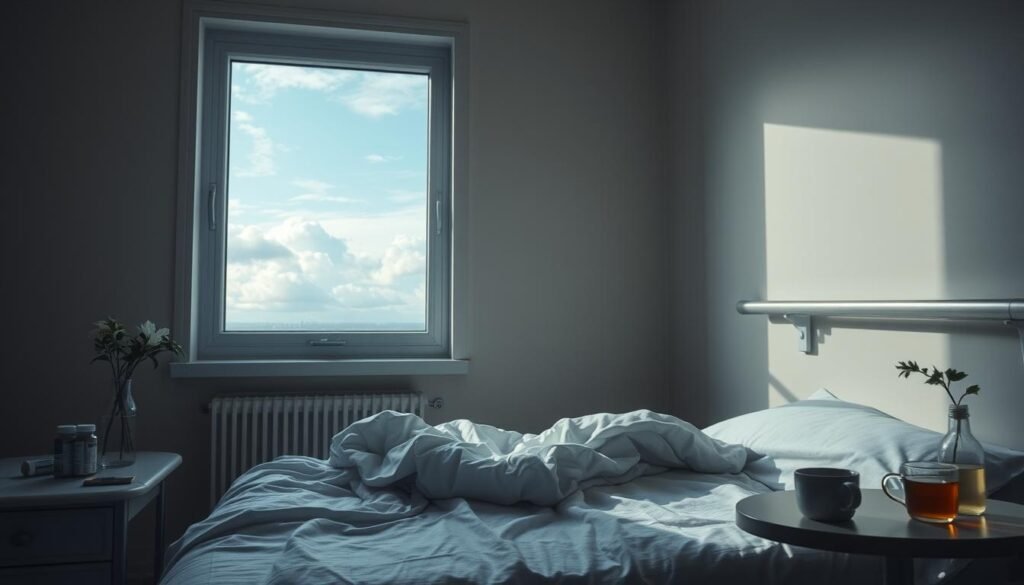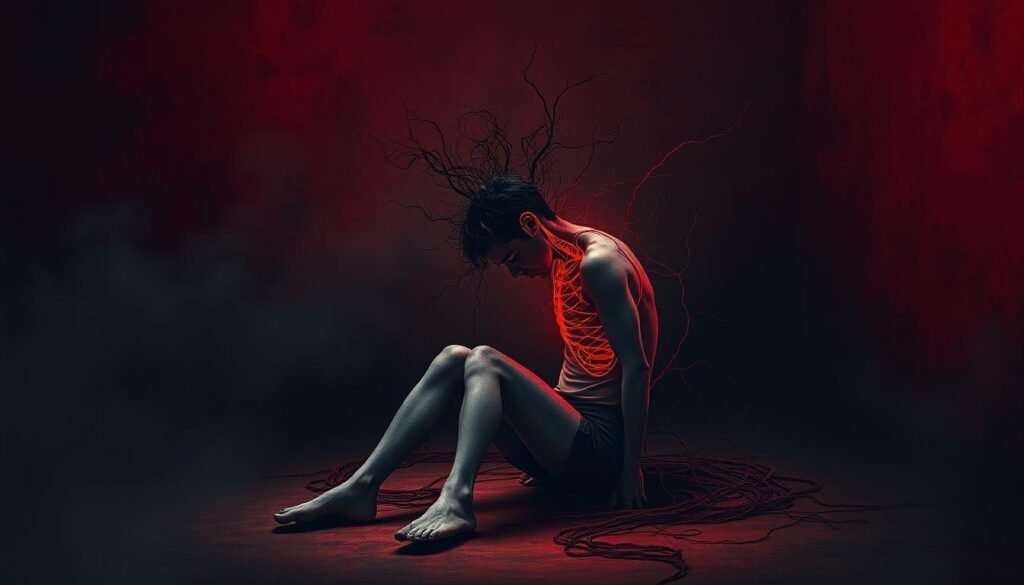Did you know about 90% of people with cancer feel very tired? This fact reveals a common yet tough part of cancer that deeply affects patients. Cancer-related fatigue is more than just being tired. It includes symptoms that impact someone’s body, feelings, and thoughts. Knowing about this enduring tiredness is key for those dealing with cancer treatment.
The reasons behind cancer fatigue are complex. They range from the cancer’s severity to treatment side effects, emotional challenges, and other health issues. Fatigue can start before someone knows they have cancer and continue long after treatment ends. This shows how big of an issue cancer fatigue is. It needs careful attention. For more info on fatigue causes, look at the Mayo Clinic resource.
Handling the lasting tiredness from cancer can be tough. But, knowing the symptoms and how cancer and treatments play a role can help. It enables patients to find good ways to handle their fatigue.
Key Takeaways
- Cancer-related fatigue affects about 90% of cancer patients, impacting their daily lives.
- Fatigue encompasses more than tiredness; it can significantly affect emotional and mental well-being.
- Various factors, including cancer aggressiveness and treatment side effects, contribute to cancer fatigue.
- Recognizing and addressing fatigue early can enhance quality of life for cancer patients.
- Effective management strategies involve healthcare professionals, self-care practices, and support from loved ones.
Understanding Cancer-related Fatigue
Cancer-related fatigue (CRF) is an intense tiredness that hits those fighting cancer. It’s different from normal fatigue because it doesn’t go away with rest. This extreme tiredness comes from the disease, its treatments, and other stressors.
Defining Cancer-related Fatigue
Cancer-related fatigue means having no energy. It’s not just about feeling physically tired. Many say it’s worse than pain or nausea from treatment. Around 65% of cancer patients go through it during their treatment. And for many, it lasts even after treatment ends.
Prevalence and Impact on Patients
Many people suffer from cancer fatigue. It affects daily life and can last for a long time. It makes working, hanging out with friends, and maintaining relationships hard. Patients feel irritable, weak, and can’t focus well.
The impact goes beyond physical tiredness. It also affects mental health and emotional well-being. This makes cancer-related fatigue a big challenge for affected individuals.
Common Symptoms of Cancer Fatigue
Cancer fatigue is hard for many who fight this disease. It’s essential to know its symptoms to manage it better. Patients often feel both physically and emotionally drained. This seriously affects their life quality.
Physical Symptoms
Many with cancer experience physical symptoms of fatigue. These symptoms make daily life harder.
- Overwhelming tiredness that rest doesn’t fix.
- Weakness in muscles, making easy tasks hard.
- Malaise or feeling uncomfortable all day.
- Lack of energy affecting work and social life.
Studies show nine out of ten people with cancer face fatigue. It can last even after treatment is over. Lifestyle changes may be needed to deal with the physical side.
Emotional and Mental Symptoms
Emotional health is crucial when dealing with cancer fatigue. Patients may feel:
- Anxiety about treatment or the future.
- Depression from feeling alone or burdened.
- Difficulties in concentrating, affecting daily life.
Emotional fatigue can make negative feelings worse. Handling both the physical and emotional aspects is key. This helps improve life quality during this tough time.
| Symptom Type | Common Symptoms |
|---|---|
| Physical Symptoms |
|
| Emotional Symptoms |
|
Knowing these symptoms is key for good management and getting support. Cancer fatigue greatly affects daily life and being social.
How Cancer Affects Energy Levels
Cancer has a complex effect on energy levels. Patients face both physical and psychological challenges that make them feel tired. It’s important to understand how cancer’s physical effects and stress are linked to energy.
Physical Toll of Cancer
Cancer causes physical fatigue for many reasons. Tumors create limits on the body, while pain and other health problems increase tiredness. During treatments like chemotherapy, about 80% of patients feel very tired. This shows how cancer affects energy.
Conditions like anemia from treatments also reduce energy. Studies find that 30% of patients have long-term fatigue after their treatment ends.
Psychological Stressors
Feeling stressed, anxious, or depressed also leads to fatigue. This mental tiredness adds to the physical exhaustion, creating a hard-to-break cycle. Research shows these feelings can hurt mood, thinking skills, and life quality.
Getting help through therapy or mindfulness can help with these mental challenges. This support can bring back a feeling of energy.
The link between physical symptoms and psychological stress shows the need for full care plans. By understanding fatigue’s root causes, better support and interventions can be developed.
How cancer and treatments contribute to long-lasting tiredness
Cancer affects a person’s health, especially causing long-lasting tiredness. It’s key to know how the disease and its treatments make fatigue worse. This helps manage life quality for those affected.
Cancer Aggressiveness and Fatigue
Advanced cancers put a lot of strain on the body, leading to more fatigue. Studies show most people with cancer feel very tired, more than usual. They struggle with daily tasks and keeping up mentally.
Even after treatments, tiredness can stick around. Some feel tired for over 18 months after their diagnosis. Ongoing support is crucial during this recovery time.
Impact of Treatments
Therapies like chemo, radiation, and surgery cause tiredness too. They affect how the body works and its energy levels. Aggressive cancer treatments add to this problem.
Nearly all patients face this overwhelming tiredness, and rest doesn’t always help. It’s important to work on improving life quality. Things like exercise and eating right can help. Experts recommend 30 minutes of exercise five days a week to help with fatigue.
Emotional and Psychological Responses
Feeling tired all the time isn’t just physical. It also involves emotions. The constant battle with cancer and its treatments can make people feel depressed or helpless. These feelings make fighting fatigue even harder.
Getting help from doctors and using resources like nutritional counseling and mindfulness can make a big difference. This support helps improve both emotions and energy levels.

Treatment-related Causes of Fatigue
Cancer treatments can cause different levels of fatigue. Understanding fatigue from chemotherapy, radiation therapy, and immunotherapy is important. This knowledge helps manage expectations and caregiving.
Chemotherapy and its Side Effects
Chemotherapy’s side effects are well-known, with fatigue being very common. Over 80% of patients undergoing chemotherapy experience this fatigue. It usually peaks after treatment.
Patient’s energy levels can slowly return between sessions. But, it might take a month or more to feel normal after completing chemotherapy. Anemia from chemotherapy drugs can also lower energy by reducing red blood cells which transport oxygen.
Radiation Therapy and Fatigue Patterns
Radiation therapy leads to a unique fatigue known as radiation therapy fatigue. It starts a few weeks into treatment. Unlike chemotherapy’s acute fatigue, this fatigue builds over time, peaking at the end.
Patients may face sleep problems, nausea, and loss of appetite. These issues can make the tiredness worse during therapy. The exact cause of this fatigue is still being studied, but it’s a big challenge for patients.
Immunotherapy’s Role in Exacerbating Fatigue
Immunotherapy adds to the complexity of cancer fatigue. Immunotherapy fatigue varies with treatment type, appearing within weeks to months. Patients may have fluctuating fatigue levels, depending on how their body reacts to therapy.
Managing this fatigue is key, as it influences motivation and well-being. To find natural remedies for recovering during and after treatment, click here.
Other Contributing Factors to Cancer Fatigue
People with cancer often feel very tired. It’s not just about the treatment. Many things impact how tired they feel and for how long. Knowing these things helps manage the tiredness better.
Anemia and Its Effects
Anemia is common during cancer treatment. It means not having enough red blood cells. This makes you feel very tired and weak. To feel better, some may need iron supplements or blood transfusions when anemia is a big problem.
Chronic Pain and Its Role
Chronic pain is common in cancer patients. It takes away energy and makes it harder to get better. This pain makes the tiredness worse. Managing the pain can help lessen how tired you feel.
Emotional Difficulties: Depression and Anxiety
Feeling anxious or depressed can make cancer fatigue worse. These feelings often come with cancer. It’s important to deal with these emotions. Things like talking to someone, joining support groups, or trying stress relief can help.
The table below shows how these factors affect tiredness and ways to manage them:
| Factor | Impact on Fatigue | Potential Management Strategies |
|---|---|---|
| Anemia | Contributes to lower energy levels and significant tiredness. | Iron supplements, blood transfusions, dietary adjustments. |
| Chronic Pain | Drains energy and amplifies the perception of fatigue. | Pain management therapies, physical therapy, medication adjustments. |
| Emotional Difficulties | Can lead to increased levels of fatigue and decreased motivation. | Counseling, support groups, stress management techniques. |

Identifying When Fatigue is a Cause for Concern
It’s key for patients and caregivers to understand cancer-related fatigue. Noticing severe fatigue can change a patient’s life. It may point to serious problems needing attention. It’s crucial to tell the difference between normal tiredness and exhaustion that stops normal activities. This section gives details on severe fatigue symptoms and when to seek help.
Recognizing Severe Fatigue Symptoms
Severe fatigue is when you’re so tired, rest doesn’t help. Key symptoms include:
- Unexplained weight loss of 10 pounds or more
- Persistent night sweats and fever without infections
- Chronic pain without a known cause
- Notable skin changes, such as jaundice or unusual moles
Concerns about cancer fatigue grow when it comes with symptoms like more shortness of breath, constant pain, and mental distress. If you have these symptoms, talk to your healthcare team to understand your condition better.
When to Seek Professional Advice
Talking to healthcare professionals early is crucial for managing cancer fatigue. Contact your doctor if you have:
- Fatigue that stops you from daily activities
- Persistent symptoms that don’t get better with rest
- Severe emotional distress or anxiety
Studies show that dealing with these symptoms quickly can help you manage them better and live a higher-quality life. For more, you can read about fatigue in cancer patients in detail here. Being proactive and watchful helps patients deal better with their cancer, getting the right support for severe fatigue.
Effective Strategies for Managing Cancer Fatigue
Dealing with cancer fatigue takes various approaches. These include self-care, eating right, and staying active. These steps don’t just lessen fatigue. They also make you feel better during treatment. By using these methods, people can greatly improve their life quality when facing cancer fatigue.
Self-Care Techniques
Self-care is key for handling cancer fatigue. Techniques like mindfulness, relaxation, and cognitive behavioral therapy (CBT) lessen fatigue levels. These methods help you feel more in control. They cut down anxiety and the feeling of being alone. Joining support groups also helps emotionally. They offer a space for shared experiences and support.
Nutrition and Hydration
Eating right is crucial in the fight against fatigue. Having small, balanced meals throughout the day keeps energy up. Your diet should include a mix of fruits, veggies, grains, and proteins for health. Drinking 8 to 10 cups of liquids a day is also important. It helps maintain energy and supports the body. For people with anemia, EPO treatments can be a game changer. They boost red blood cells, improving energy and life quality.
The Role of Physical Activity
Being active daily helps manage cancer fatigue. Aim for 3 to 5 hours of moderate exercise each week. This can boost mood, energy, and appetite. Simple exercises like walking, yoga, or stretching can refresh the body. Occupational and physical therapists can create exercise plans. These are made to suit your abilities and save energy for daily tasks.

| Strategy | Description |
|---|---|
| Mindfulness | Practices focused on living in the present moment to reduce stress and fatigue. |
| Nutrition | Consuming small, balanced meals throughout the day for energy maintenance. |
| Physical Activity | Engaging in moderate exercise for improved mood and energy levels. |
| Support Groups | Community interactions that provide emotional support and reduce anxiety. |
| Cognitive Behavioral Therapy | A therapeutic approach that can help moderate fatigue levels. |
Using these strategies every day helps individuals manage cancer fatigue better. It leads to a more rewarding recovery journey. The search for effective treatments is ongoing. It continues to show promise for those dealing with fatigue from cancer.
Seeking Support: Medical and Holistic Approaches
Fighting cancer fatigue is key to improving quality of life. Patients should talk to health experts to make a personal plan for managing fatigue. Getting medical help for this fatigue is crucial for health and recovery.
Consulting Healthcare Professionals
Teaming up with doctors and nurses is important. They can suggest the best treatments and support. This support might include traditional and holistic methods. Keeping regular appointments lets patients get the full care they need.
Integrative Medicine Options
Holistic methods are gaining attention for their role in tackling cancer fatigue. They work alongside regular treatments:
- Acupuncture may help with chemotherapy-induced nausea.
- Aromatherapy can ease nausea, pain, and stress.
- Cognitive Behavioral Therapy (CBT) might improve sleep issues.
- Exercise boosts life quality and survival rates.
- Massage therapy helps in lowering pain, stress, and anxiety.
- Meditation reduces anxiety and uplifts mood.
- Music therapy alleviates pain, controls nausea, and reduces anxiety.
- Relaxation techniques help with anxiety, fatigue, and sleep improvement.
- Yoga aids in stress relief and might lessen fatigue.
- Tai chi helps in stress management for cancer patients.
Blending medical support with holistic treatments enhances patient outcomes. It leads to a more complete approach to recovery and wellness.
Conclusion
Overcoming cancer-related fatigue needs a well-rounded approach. It touches both the body and mind. Between 60-96% of patients feel this tiredness during treatment, affecting their life quality.
Fatigue might start even before treatment. It varies across cancer types. Patients with gastrointestinal cancer often feel very tired early on. This shows we need specific ways to handle these symptoms.
Doctors should keep talking with their patients about fatigue. Using self-care, professional help, and other treatments helps a lot. We can’t ignore how fatigue affects emotions, sleep, and mental health.
Many people still feel tired after beating cancer. This issue needs ongoing focus. Working together, patients and doctors can improve healing and life quality.
Fighting fatigue is key in dealing with cancer. It requires constant work. But, with support and knowledge, overcoming this fatigue becomes a shared goal. This leads to better recovery.